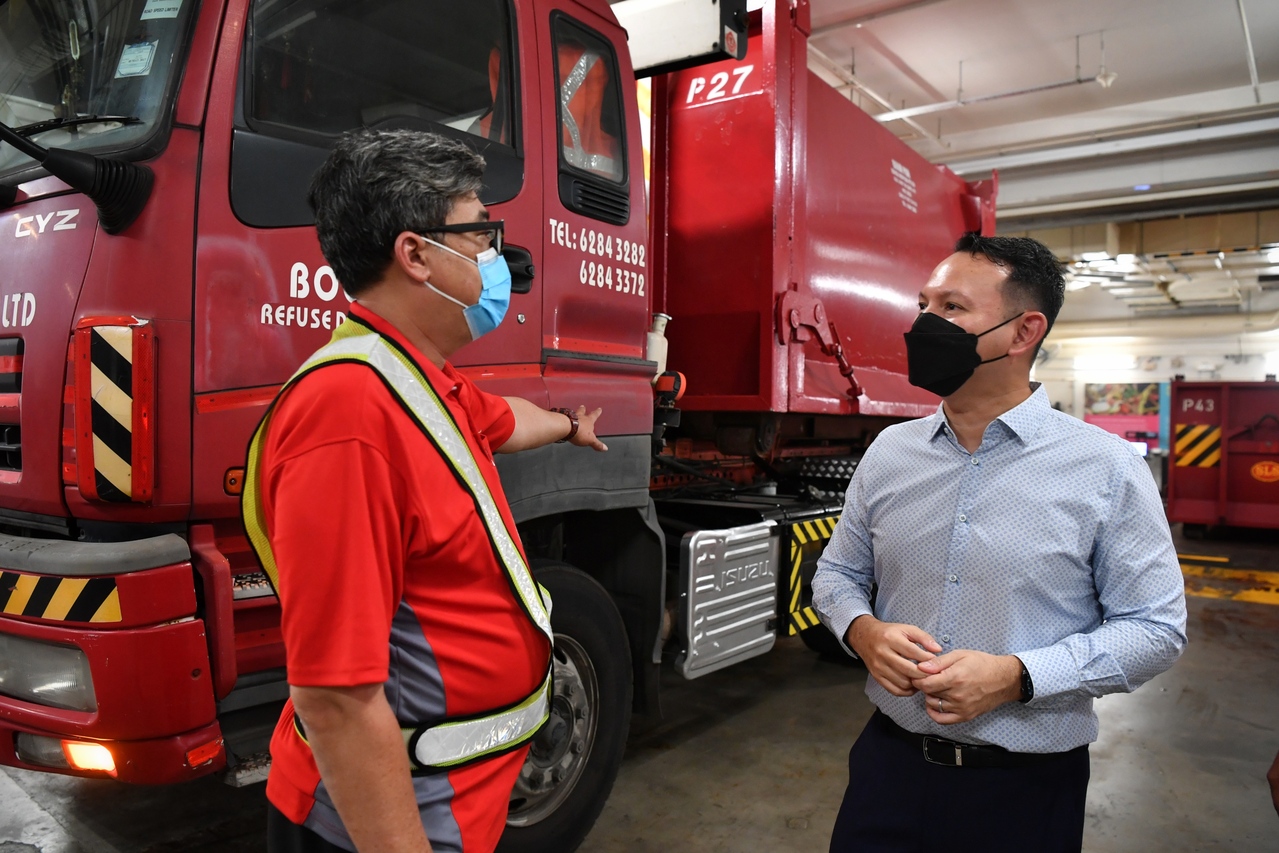Better pay for waste management workers will drive up costs for firms
Sign up now: Get ST's newsletters delivered to your inbox

Senior Minister of State for Manpower and Defence Zaqy Mohamad (right) speaking to hooklift driver Leong Siew Nam at the PLQ Mall waste sorting facility on Jan 24, 2022.
ST PHOTO: CHONG JUN LIANG
Follow topic:
SINGAPORE - While waste management workers welcomed the news of increased pay under the new Progressive Wage Model (PWM) for the sector unveiled on Monday (Jan 24), employers and service providers acknowledge that it will drive up costs.
Yet, this increased cost is expected to be commensurate with higher service standards delivered by more skilled workers, as well as higher productivity as firms in the sector transform using technology, the employers and service providers added.
Under the PWM introduced by the tripartite cluster for the waste management industry, the monthly baseline wage for an entry-level waste collection crew worker is expected to jump by almost 50 per cent over a six-year period, starting from July 1, 2023.
Waste management workers will also get a mandatory annual bonus from January 2024, which aims to help the sector retain and attract local workers.
Ms Melissa Tan, chairman of the Waste Management and Recycling Association of Singapore, said that the start date of July 2023 gives firms in the sector lead time to factor in the increased labour costs when preparing new contracts or bidding for them.
"But it is also important for service buyers to plan their budgets and consider adopting best practices, such as stipulating service delivery outcomes instead of the fixed frequency of waste collection," she said.
"For existing contracts that will expire after July 1, 2023, the tripartite committee encourages both service buyers and providers to engage in open discussion and be very transparent with one another to reach an amicable agreement on contracts."
Mr Felix Loh, Singapore National Employers Federation deputy honorary secretary, added that cost is definitely a top consideration for the employers.
He urged the Government to provide transitional support for companies as they adjust the wages for workers.
But he added that the higher wages should be tied to better skills among the workers who can now do higher value work, as well as technological improvements in the firms and better service standards.
"The focus of the recommendations is on the workers. We hope this (wage increase) will be paid for through the use of better technology that will increase the sector's productivity. The key (aspect) of PWM is that it is linked to skill sets and hopefully higher productivity," he said.
"Consumers also have a part to play. When we demand better services, it is also fair to pay fair wages to the workers."
Ms Lim Lijuan, director of waste management service provider Boon Poh, said the firm has about 100 workers, of which 10 to 20 will be covered by the new PWM.
“We hope service buyers will help us defray these extra costs since, at the end of the day, they benefit the workers,” she said, adding that most service buyers should be supportive.
"We will have to look at cost sharing. In the end, costs will rise, not just in our industry but also across the board," she added.
She also said she hoped the labour union could provide firms with subsidies for training courses, as attaining more training such as Workforce Skills Qualifications modules will be part of the skills roadmap for workers under the PWM.
Higher pay and training prospects will also help waste management workers to stay in the sector and upgrade themselves, employees said.
Mr Leong Siew Nam, 50, a hooklift driver, said: "I will continue in this career. It is good to go for more training so I can improve myself."
He said he earns over $2,000 now. A hooklift driver should be earning $2,710 from July 1 next year and $3,760 from July 1, 2028.
"I am definitely happy to earn more money," he added.
Mr Yeo Hock Lye, 61, who works as a sorter at Boon Poh, is looking forward to skills upgrading so he can handle different types of materials.
"I am happy to go for more training in the future so I can learn new types of things to do," he said, adding that the higher pay will also attract more workers to join the sector.
The pay of a sorter in the materials recovery sub-sector should hit $2,110 next year and reach $3,160 come 2028.

